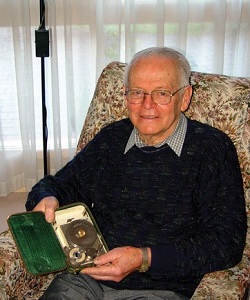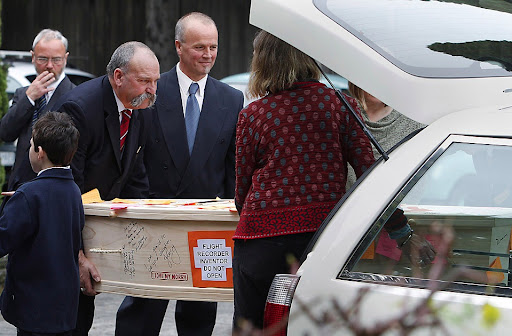I'd meant to post about this earlier, but in the rush of other activities it kinda slipped my mind for a bit. Still, better late than never, as they say in the classics.
 Dr. David Warren, inventor of the so-called 'black boxes', the flight data recorder and cockpit voice recorder (sometimes separate instruments, sometimes combined in a single unit) found in almost all commercial and military aircraft, died on July 19th at the age of 85. Commercial aviation owes him an incalculable debt.
Dr. David Warren, inventor of the so-called 'black boxes', the flight data recorder and cockpit voice recorder (sometimes separate instruments, sometimes combined in a single unit) found in almost all commercial and military aircraft, died on July 19th at the age of 85. Commercial aviation owes him an incalculable debt.In 2003, Gizmag published an overview of Dr. Warren's work. Here's an extract.
Dr Warren worked in his capacity as a chemist specialising in aircraft fuels at the Aeronautical Research Laboratories where he found himself [in the early 1950's] part of a "think-tank" investigating the possible causes of a recent Comet Jet Aircraft crash and prepare Australian infrastructure for commercial jet aircraft.
New fuels being used in Jets in the early 50's were more likely to become explosive at altitude than conventional aircraft fuels and this was identified as a possible cause of the Comet crash. This was the area of specific investigation for David - then still in his early 20's - but it was at this two-day meeting the he hit upon the idea of a flight recorder.
While listening to the arguments over possible causes of the crash, one of which was the new phenomenon of hijacking, Dr Warren realised that the solution could well be at hand if someone on the plane had been carrying a device similar to the then newly released Protona Minifon portable recorder that had caught his eye at a trade fair. Mention of the device to his superiors fell on deaf ears initially, but with support from colleagues and his own faith in the idea he continued to refine the idea in his own time.
The device would be fire proof (using steel wire as the recording medium like the "Pocket Recorder") and erase itself so that the last hours of the flight were always recorded.Dr Warren wrote the initial ground breaking report for ARL entitled "A Device for Assisting Investigation into Aircraft Accidents" in 1954.
Despite being published twice (including overseas), the report still failed to generate much interest and with further support form new Superintendent Tom Keeble, it was decided to take a "Show and Tell" approach by creating a prototype. After a series of tests the first "ARL Flight Memory Unit" was then produced.
The device consisted of a single steel wire as the recording medium and provided four hours of recording and automatically switched itself on and off with the aircraft. It was during this period that Dr Warren incorporated the idea of recording instruments on a separate channel - his interest in electronics as a schoolboy was brilliantly applied to turn instrument readings into recordable dots and bleeps.
Using this technique, the original unit was able to record data from 8 instruments every 2 seconds.The response was still less than encouraging with authorities still reluctant to accept the potential benefits of the device.
The project was given fresh impetus after David, who was working on the prototype during a lunchbreak) was given a brief introduction to the Secretary of the UK Air Registration Board, Sir Robert Hardingham in 1958. Hardingham immediately recognised potential of the flight memory device and David was put on a four day flight to England to demonstrate the invention. The flight (almost the only tangible reward Dr Warren has ever received for his invention) was an adventure in itself.
A detour through Africa eventuated in a historic recording of a lion hunt in Nairobi and the first ever "black box" recording on the last leg of the flight - chiefly because Dr Warren was nervous about the fact that one engine was out.
The recorder was well received in England (where the name "Black Box" was coined by a journalist at a briefing) and also in Canada where the idea was seen as a potential addition to beacons being developed there.
Dr Warren continued to lead the project, developing the Flight Memory device to record more instruments with greater accuracy. This led to the first commercially produced flight-recorder - the Red Egg - which was manufactured by British firm of S. Davall & Son and captured a large part of the British and overseas market at that time.
Following the crash of a Fokker Friendship plane in 1960 in Queensland, a judicial order required that all Australian airliners carry speech recorders. Australian authorities ignored the local talent and awarded the contract to USA company which caused delays in development and installation.
A further disaster at Wintoon in 1967 saw Australia became first country to make both flight data and cockpit voice mandatory on all turbo-props and jets.
Dr Warren is aware that support in the initial phase of his invention could have resulted in wider benefits to Australia and himself, but remains philosophical - the attitude he faced at the time was one of "if its any good the Americans would have it already" but Dr Warren takes satisfaction from the benefit the idea has wrought and believes that keeping an open mind will help us to avoid the mistakes made by his superiors in the past - "As you get older, you shouldn't lose the excitement of something new".
There's more at the link.
I had to laugh at the excuses offered by pilots and bureaucrats opposed to implementing 'black boxes' in aircraft. In its obituary of Dr. Warren, the Independent reported:
The idea was not at first well received by airlines. Pilots rejected the concept, fearing that these black boxes might be used to spy on crew, and their union, the Pilots' Federation, insisted that "no plane would take off in Australia with Big Brother listening". The Royal Australian Air Force further commented that "such a device is not required" and that "... the recorder would yield more expletives than explanations".
The irony of the RAAF's opposition was not lost on Dr. Warren when, following an accident, an Australian judge ordered that country's aircraft to be equipped with 'black boxes' - the first country in the world where this became mandatory. In what seems to have been a deliberate slap in the face to their local inventor, the contract for these early recorders was awarded to a US firm.
Dr. Warren's family seems to share his irreverence for authority, tradition and bureaucracy. 'Black boxes' are typically labeled with a warning not to open them. I was therefore delighted to see that his family decorated his coffin with a label reading 'Flight Recorder Inventor - Do Not Open'! (Click the picture below for a larger image.)

I'm sure that somewhere up there, Dr. Warren was laughing his head off!
The current safety of commercial aviation is due, in very large part, to lessons learned from past disasters - lessons we would never have learned without Dr. Warren and his 'black boxes'.
Peter


1 comment:
We Aussies have invented many useful and productive items which the rest of the World has eagerly adopted.
Unfortunately, to many believe we Aussies are nothing more than the sons and daughters of Convicts and not capable of or able to produce anything of value The record however says otherwise. We may be at the bottom of the World but we're often at the top of the world with the things we come up with
Post a Comment